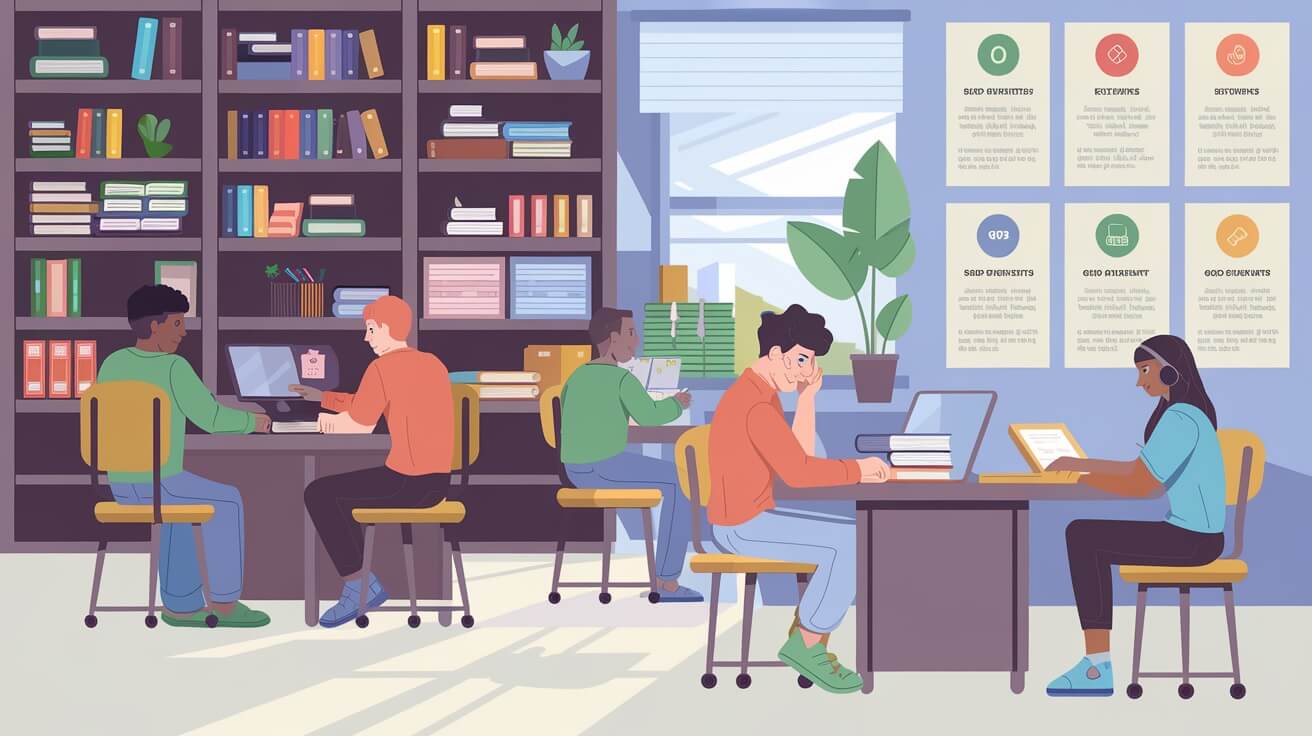
Achieving academic success isn't just about studying harder; it's about studying smarter. How you organize your time, approach your learning, and maintain consistency can make all the difference in your educational journey.
This article explores a comprehensive guide to developing effective study habits grounded in research and real-life examples to help you excel academically.
What Are Effective Study Habits?

To excel academically, you need more than effort—a strategic approach. Effective study habits aren't just about putting in work hours; they're about using time wisely, staying consistent, and engaging actively with your material. These habits can reduce stress, enhance retention, and support you in achieving your academic goals more quickly.
Understanding the Core of Effective Study Habits
At their foundation, effective study habits are about discipline, engagement, and adaptability. They require a steady commitment to structured learning while being flexible enough to adjust to different subjects, learning styles, or challenges.
Characteristics of Effective Study Habits
Consistency:
Regular, scheduled study sessions outperform cramming. A well-planned routine helps embed learning into your long-term memory. For instance, dedicating an hour each evening to reviewing your notes creates a sustainable rhythm that reinforces your understanding over time.
Active Engagement:
Learning is most effective when you actively participate. Summarizing, teaching concepts to others, and solving problems are far more impactful than passively reading or highlighting text. These methods encourage deeper cognitive processing, making the material stick.
Reflection:
Evaluating your progress and adapting your strategies is critical. Reflection lets you identify what's working and what's not and how to improve your approach.
Proven Study Techniques That Work

Active Recall
Active recall is a highly effective strategy for improving information retention. Deliberately retrieving information from memory strengthens the neural pathways associated with that knowledge.
Unlike passive methods like rereading, active recall forces your brain to work harder, enhancing long-term retention.
Imagine preparing for a history exam. Rather than simply rereading your textbook, try making flashcards with questions on one side and answers on the other. Testing yourself highlights gaps in knowledge and reinforces what you already know.
Research from Purdue University found that students who practiced active recall remembered up to 50% more information than those who used passive methods.
Spaced Repetition
Spaced repetition leverages the brain's natural ability to forget. By revisiting material at increasing intervals, you ensure it stays fresh in your memory.
Start by reviewing material shortly after learning it, then revisit it a few days later, a week later, and so on. Over time, you'll need to review less frequently as the information becomes ingrained.
Apps like Anki simplify spaced repetition by automating review schedules based on your progress with specific flashcards.
Studies on the Ebbinghaus forgetting curve show that spaced repetition can reduce the rate of forgetting by up to 70%, making it an essential technique for long-term retention.
Pomodoro Technique
The Pomodoro Technique is perfect for maintaining focus and avoiding burnout. You can stay productive without feeling overwhelmed by working in short bursts followed by breaks.
This method trains your brain to concentrate intensely for 25 minutes at a time, followed by a 5-minute break to recharge. After four sessions, you take a longer break of 15–30 minutes.
Use a timer to stay disciplined. Apps like Forest can help by keeping you focused while gamifying the process.
According to the study report of the National Institute of Mental Health (NIMH), regular breaks can improve overall productivity by up to 25%.
Crafting an Optimal Study Environment
Your environment is critical to your ability to concentrate and retain information. A well-designed study space minimizes distractions and maximizes productivity.
Key Factors to Consider
Lighting:
Proper lighting is essential. Natural light is ideal, but a bright desk lamp with adjustable settings works well if that's not an option. Avoid insufficient lighting, as it may strain your eyes and contribute to fatigue over time.
Minimize Distractions:
External distractions like your phone or noisy surroundings can disrupt your focus. To create a more conducive atmosphere, turn off notifications, use noise-canceling headphones, or play background sounds like white noise.
Organization:
A tidy workspace helps you concentrate better. Keep essential tools like pens, notebooks, and reference materials within easy reach, and avoid clutter that distract you from studying.
During college, I carved out a small corner dedicated solely to studying. Over time, simply sitting in that space signaled my brain that it was time to focus. This habit made it easier to shift into study mode without wasting time.
The American Psychological Association found that students with organized study environments performed 15% better on tests than their peers with cluttered setups.
Effective study habits are about more than just hitting the books. By incorporating techniques like active recall, spaced repetition, and the Pomodoro method and creating a study environment tailored to your needs, you can achieve your academic goals while minimizing stress.
These strategies aren't about perfection—they're about progress. Implementing even one or two of these techniques can significantly improve how you learn and retain information. Remember, success lies in consistent effort and smart approaches. Start small, stay focused, and watch your results grow.
Balancing Self-Care and Academic Goals

Your academic success depends on effective study habits and how well you care for yourself. Neglecting self-care can undermine even the most carefully planned routines, leaving you stressed, tired, and unable to perform at your best. Striking a balance between self-care and academic responsibilities is essential for long-term success.
The Importance of Sleep
Sleep isn't just about rest—it's a critical component of effective learning. While you sleep, your brain consolidates new information, organizes memories, and prepares you to tackle new challenges.
How Sleep Enhances Learning:
Studies have shown that sleep improves problem-solving abilities, creativity, and focus. Without adequate sleep, your ability to retain information plummets, making even the best study techniques less effective.
Optimal Sleep Duration:
Aim for 7–9 hours of sleep per night to ensure you're well-rested and ready to perform at your peak.
Scientific Insight:
According to the Sleep Foundation, students who sleep at least seven hours before exams score 10–20% higher than those who don't. Sleep helps consolidate memories and strengthens neural connections formed during study sessions.
Stick to a regular sleep method by going to bed and waking up at the same times daily. Avoid caffeine or screen time an hour before bedtime to improve sleep quality.
Regular Exercise
Exercise is a powerful tool for boosting physical and mental health, directly contributing to better academic performance.
How Exercise Impacts the Brain:
Regular physical activity enhances blood circulation to the brain, providing it with vital oxygen and nutrients that support cognitive function. It also promotes the release of endorphins, which reduce stress and improve mood.
Recommended Activities:
Choose moderate-intensity exercises like walking, yoga, or swimming. Even short bursts of physical activity during study breaks can refresh your mind and enhance focus.
Supporting Research:
Harvard Medical School highlights that 30 minutes of moderate exercise daily can significantly improve memory, concentration, and overall brain function while reducing stress levels.
Incorporate movement into your day by taking a 10-minute walk during study breaks or practicing light stretches between study sessions.
Nutrition and Hydration
Like any other body part, your brain needs the right fuel to function optimally.
Balanced Diet for Academic Success:
Omega-3-rich foods like salmon, walnuts, and flaxseeds are excellent for brain health, supporting memory and cognitive abilities. Complex carbohydrates, such as whole grains, provide steady energy throughout the day. At the same time, fruits and vegetables supply essential vitamins and antioxidants.
Stay Hydrated:
Even mild dehydration can impair focus and energy levels. Drink 8–10 glasses of water daily to stay hydrated and alert and support your brain's performance.
Keep healthy snacks like almonds, fresh fruit, or yogurt on hand during study sessions. These choices offer long-lasting energy and help you avoid the quick energy dips that come with sugary snacks.
Leveraging Technology to Optimize Learning

When used strategically, technology can transform your study habits. The right tools can save time and make your sessions more productive, from organizing materials to reinforcing learning.
Recommended Tools
Note-Taking Apps:
Tools like Notion and Evernote allow you to keep all your study materials organized in one place. They also enable easy search functionality to find what you need quickly.
Flashcard Apps:
Apps like Anki and Quizlet are ideal for active recall and spaced repetition, helping you retain information effectively.
Task Managers:
Platforms like Trello and Asana can help you track deadlines, set goals, and monitor progress.
Real-Life Example:
During my exam prep, Quizlet became an indispensable tool. Creating digital flashcards allowed me to quiz myself on critical concepts, saving hours compared to traditional methods.
Statistical Insight:
A report by Educause revealed that 74% of students using educational apps found them to improve their study efficiency and organization significantly.
Use these tools wisely. Turn off notifications and set specific goals for each study session to avoid getting sidetracked.
Overcoming Common Study Challenges
Even with the best intentions, obstacles like procrastination and distractions can derail your study efforts. Here's how to tackle them effectively.
Procrastination
Putting off tasks often leads to unnecessary stress and last-minute cramming.
Break large tasks into smaller, manageable steps. For example, start by outlining the introduction or gathering sources instead of writing an entire essay in one sitting. Reward yourself for completing each step to stay motivated.
Breaking tasks into smaller pieces reduces overwhelm and gives you a sense of accomplishment with each milestone.
Distractions
Distractions from social media, noisy environments, or multitasking can severely impact productivity.
Identify common distractions and create boundaries. For instance, use your phone's "Do Not Disturb" mode during study sessions or set specific times to check social media.
Apps like Forest Gamify focus on planting virtual trees while you stay on task. Exiting the app before the timer finishes causes your virtual tree to wither—a surprisingly motivating feature!
Research from the University of California, Irvine, indicates refocusing takes about 23 minutes after distraction. Eliminating interruptions is critical to efficient studying.
Conclusion
Building effective study habits is about consistency, self-awareness, and strategies. Small adjustments, such as practicing active recall, setting up a distraction-free workspace, or prioritizing self-care alongside academics, can result in noticeable improvements.
Start today—implement one strategy at a time, track your progress, and celebrate your achievements. Remember, academic success isn't about perfection; it's about persistence.
FAQs
What is the most effective study technique?
Active recall is one of the most effective methods for retaining information.
How can I stay motivated to study?
Set clear goals and use rewards to maintain motivation.
What's the best way to handle distractions?
Identify your distractions and plan to minimize them, such as using apps like Focus@Will.
How much sleep do students need?
Strive to get 7 to 9 hours of restful sleep each night to perform at your best.
Are study apps worth it?
Yes, tools like Quizlet and Notion can save time and improve organization.
Study Tips Study Motivation




